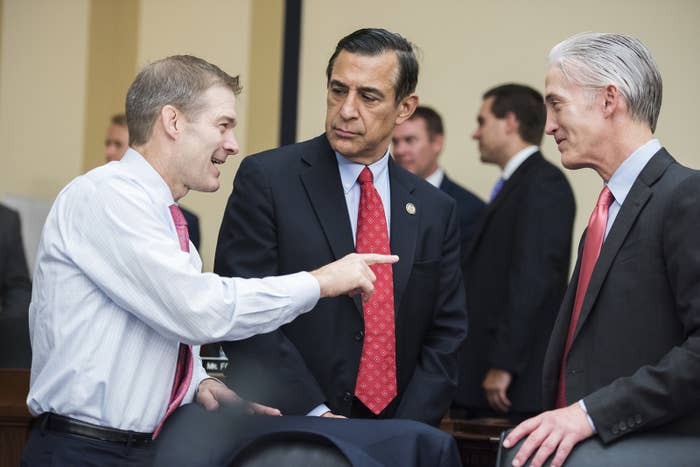
WASHINGTON — A series of court rulings favoring Republicans in their fight with the Obama administration over access to documents — rulings that the Trump administration unsuccessfully tried to get tossed out this year — could come back to haunt them as Democrats take control of the House of Representatives.
House Republicans spent years wrangling in court with former attorney general Eric Holder over a subpoena for Justice Department documents about a botched gun sting program known as Operation Fast and Furious. The Republicans scored key wins, with the judge rejecting the Obama administration’s argument that this was the sort of political dispute that shouldn’t be in court, and finding that the White House couldn’t make sweeping privilege claims to keep broad categories of documents out of Congress’s hands.
Assuming Democrats make good on their pledge to use their new majority status to launch investigations into Trump and his administration, à la what Republicans did during the Obama years, having these rulings on the books will be bad for the executive branch. Expect Democrats to cite them — and judges to seriously consider them — if the Trump administration tries to fight Democratic demands for information. They’ve already been cited in numerous law review articles.
Democrats on the House Oversight Committee have a laundry list of investigations that Republicans have blocked them from pursuing so far. Over the past two years, Republicans have voted down Democratic requests for subpoenas on topics ranging from family separations at the border to the addition of a citizenship question on the 2020 census to Russian interference in the 2016 election.
In the months leading up to the midterm elections, the Trump administration tried to get two key rulings in the case stricken from the record. In March, the Justice Department announced a tentative settlement with House Republicans: The department would produce additional documents if the judge, US District Judge Amy Berman Jackson, would agree to vacate her earlier decisions.
In a sharply worded opinion on Oct. 22, Jackson denied the request. Although the case is still pending — House Republicans appealed several rulings against them — there were few issues that hadn’t been resolved, she wrote.
“So there was little if anything to negotiate, and the only real change in circumstance since the filing of the appeal has been the change in political leadership at the Department of Justice in the wake of the Presidential election,” Jackson wrote. “This suggests that the primary, if not the sole, objective of the conditional settlement and the pending motion is to erase the Court’s prior rulings.”
As a district court judge, Jackson’s rulings aren’t binding on any judge who might end up with a future lawsuit between Democrats and the Trump administration on their docket. But as Jackson noted in last month’s opinion, judges find their colleagues’ opinions “helpful” when a difficult or novel case comes along. Jackson pointed out that when she ruled that House Republicans could sue the Obama administration, she cited a decision from a case dating back to the George W. Bush administration, finding it “persuasive and instructive.”
Tara Grove, a law professor at William & Mary Law School who has been following the Fast and Furious litigation, said she was surprised by the request to have the judge vacate the earlier orders, since they aren’t binding. Grove speculated that Republicans didn’t want Democrats to be able to point to such a recent example of Republicans making this sort of demand of the executive branch and then having at least some success in court.
“My assumption is that both sides assumed that the district court’s decision has some persuasive authority,” Grove said.
The case has been on hold since January 2017 as lawyers for the Justice Department and House Republicans negotiated a settlement. On Nov. 2, they filed papers saying that they were “discussing next steps” in light of Jackson’s ruling, “including whether to resume settlement negotiations.” They asked for another 30 days before filing another report on their status.
Once Democrats take control of the House next year, they’ll be able to dictate the future of the litigation — the House general counsel reports to House leadership.
House General Counsel Thomas Hungar and a Justice Department spokesperson declined to comment.

“Fundamentally flawed” operation
The case came out of the Justice Department’s refusal to comply with a 2011 congressional subpoena for documents about Holder’s response to fallout from Operation Fast and Furious. US officials had allowed guns bought illegally in the United States to move across the border into Mexico, with the goal of tracking where they went and who was buying them. Some of those weapons were found at the scene of the 2010 murder of a US Border Patrol agent, Brian Terry.
The Justice Department at first denied signing off on a gun-walking operation, but later withdrew that denial and acknowledged that the program was “fundamentally flawed.” Congressional Republicans launched investigations not only into the substance of the program but also how the Justice Department had responded to congressional inquiries.
On June 20, 2012, Obama claimed executive privilege over Justice Department documents after Feb. 4, 2011, which is when the department initially denied allowing gun walking. Later that month, the House of Representatives voted 255–67 to find Holder in contempt of Congress.
In August 2012, the House Committee on Oversight and Government Reform sued the Justice Department to enforce its subpoena.
In September 2013, Jackson denied the Obama administration’s motion to dismiss the lawsuit. She rejected the Justice Department’s argument that the case was the type of “political dispute” that courts shouldn’t get involved in. Courts had addressed legal questions about subpoenas and executive privilege before, she found.
“To give the Attorney General the final word would elevate and fortify the executive branch at the expense of the other institutions that are supposed to be its equal, and do more damage to the balance envisioned by the Framers than a judicial ruling on the narrow privilege question posed by the complaint,” Jackson wrote at the time.
Over the next three years, Jackson issued two rulings that the Trump administration and House Republicans tried to get thrown out this year. In August 2014, the judge held that the Justice Department couldn’t make a blanket claim of privilege over all documents after a certain date — the department had to make a detailed list identifying documents it believed were privileged and shouldn’t be turned over to Congress.
DOJ turned over more than 10,000 documents and came back with a list of records it maintained were privileged. Republicans argued Jackson should force the administration to produce those documents too.
In January 2016, the judge issued another decision. She rejected House Republicans’ argument that records documenting internal discussions about how to respond to Congress and the media couldn’t be shielded by what’s known as the “deliberative process privilege.” But although she found that these types of documents could be privileged, she also concluded that the privilege could be outweighed if there was a “sufficient showing of need.”
In the end, though, Jackson ordered the Justice Department to produce the documents for other reasons. She found that DOJ had already acknowledged the legitimacy of the congressional investigation into Operation Fast and Furious, and the substance of many of the documents had become public via the Justice Department’s inspector general. The privilege “must yield,” she wrote. The Oversight Committee appealed, disagreeing with Jackson’s analysis on the privilege issue and arguing that she should have ordered DOJ to produce everything.
In a December 2016 court filing, the Justice Department said it had produced all of the documents previously withheld as privileged. The department said it also allowed the Oversight Committee to review the bulk of the remaining documents at issue; the only information the department still wouldn’t let members see were materials that the government maintained could put informants, agents, or witnesses at risk, or jeopardize ongoing investigations. The Justice Department said the case was moot and argued the appeal should be dismissed.
In asking Jackson to vacate her earlier orders, the Justice Department argued in court papers in March that a settlement was preferable to having the courts wade any further into a political fight between two branches of government. Jackson was unconvinced.
“At the end of the day, the parties’ emphasis on the fact that they have come to an agreement that the Court should welcome rings hollow,” Jackson wrote, “and their request that the Orders be vacated because of the settlement and for no other reason is not persuasive.”

